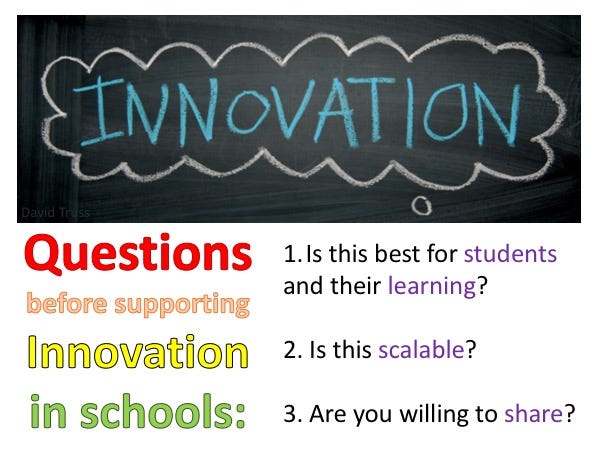3 Questions Before Supporting Innovation
1. Is this best for students and their learning?
2. Is this scalable?
3. Are you willing to share?
In a conversation with my good friend, Dave Sands, we were talking about the challenge of investing in systematic change vs supporting the outliers (and the Lone Wolves). There will always be limited resources to work with, and we can’t do everything we want to do. Of course, it is important to invest in systematic change, and to have everyone (every school, educator and student) benefit from the allocation of resources, but if we don’t support the individual pioneers, the innovators, then we may not see the possibilities to make exponential changes, rather than just incremental ones.
I threw these questions out as precursors to supporting projects by innovative educators, because each of the questions are essential to making the support worth it.
1. Is this best for students and their learning?
Sometimes ideas look innovative at first glance, but they are not focussed on what is really important. They might make things easier for the teacher, or easier to assess things that are not important, or they might have a lot of flash but not a lot of substance. If the student and the learning comes first, then it is time to ask the next two questions.
2. Is this scalable?
Not everything has to scale, and get bigger, but can it be duplicated in other classrooms? Can it be something that goes beyond a single classroom or event?
3. Are you willing to share?
It won’t scale unless people know about it. When you do something great, it needs to be shared. The ‘how’ doesn’t matter as much as the commitment to do so. One important note here is that it doesn’t have to be polished, and it doesn’t have to be about something that worked perfectly, where everything went right. We can learn through failure, and through understanding the challenges that people face along the way.
- — -
There are ‘pockets of brilliance’ happening in schools all over the world that don’t seem to scale. This brilliance needs to be supported. We need to encourage new, creative and innovative practices. However, in world of limited resources, we also need to ensure that what we learn as we innovate, is done for the right reasons, is something that can be replicated, and is something that will be meaningfully shared.
Originally published at David Truss :: Pair-a-dimes for Your Thoughts.

No comments:
Post a Comment